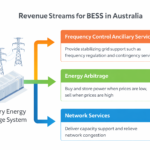The global transition to renewable energy has placed solar power projects at the forefront of sustainable development. However, managing these projects is no small feat. From navigating complex workflows to ensuring regulatory compliance, construction project management plays a pivotal role in overcoming the unique challenges of solar energy initiatives.
To explore these challenges and outline strategies to ensure successful construction project management and execution, keep reading the article below!
Challenges in Solar Power Construction
Solar power is vital to global renewable energy goals, yet adoption faces hurdles like intermittency, land-use demands, supply chain delays, and labor shortages. These challenges highlight the need for robust construction project management to execute solar projects efficiently.
Understanding these obstacles is critical for developing solutions. With effective project management, it provides the framework to navigate complexities, optimise resources, and leverage innovation for sustainable growth in renewable energy.
Grid Integration Issues
One of the most significant grid integration challenges is integrating solar-generated power plants into existing grids. Unlike conventional energy sources such as coal, diesel, natural gas, and nuclear power—which provide consistent and controllable output—solar power is intermittent, with its energy production fluctuating based on weather conditions and sunlight availability. This variability often strains the grid stability and reliability, which are originally designed for consistent energy output.
Integrating solar power plants require upgrades to transmission and distribution infrastructure, advanced forecasting tools, and the incorporation of battery storage systems. Latest inverter technologies are already equipped with grid support functions like voltage and frequency regulation to help support grid stability.
Complex Workflows
Solar projects involve multiple stages, including site selection, design, procurement, construction, and commissioning. Each phase demands coordination across diverse teams—engineers, contractors, and regulatory bodies. Misalignment at any stage can lead to cascading delays and cost overruns.
Regulatory Compliance
Navigating environmental impact assessments and adhering to regional policies can be time-consuming. For instance, approvals for solar electric plans often involve intricate documentation and stakeholder engagement. With delays in regulatory compliance, it not only affect project timelines but may also impact access to incentives or feed-in tariffs.
Budgeting and Vendor Management
Solar projects are capital-intensive, with significant investments required for materials like PV modules, inverters, mounting structures, and battery systems. Managing costs while maintaining quality often hinges on selecting reliable vendors and optimising procurement processes.
Strategies to Overcome Solar Power Challenges
Effective construction project management involves implementing targeted strategies to address these challenges head-on. To overcome these challenges, the integration of advanced technologies and collaborative frameworks is a must.
Grid Integration Solutions
To mitigate variability issues, project managers are increasingly turning to battery energy storage systems (BESS). These systems stabilise energy output by storing surplus electricity during peak production hours and releasing it when demand rises. That said, inverters play a complementary role by regulating voltage and frequency, further supporting grid stability. In addition to that, upgrading grid infrastructure ensures compatibility with renewable energy sources.
Workflow Optimisation
Centralised project management tools can streamline communication and task tracking across teams. Platforms such as Asana, Trello, and Microsoft Project allow for real-time collaboration, enabling stakeholders to monitor progress, assign responsibilities, and quickly address bottlenecks. These tools provide visibility into timelines, resource allocation, and dependencies, which helps ensure alignment with project goals and reduces the risk of delays or miscommunication.
Navigating Regulatory Hurdles
Simplifying approval processes through proactive stakeholder engagement is crucial. By building project management teams that include legal experts, it can help navigate environmental regulations efficiently while maintaining transparency with local communities.
Cost Control Measures
Predictive analytics tools are invaluable for anticipating budgetary risks and allocating resources effectively. Establishing long-term relationships with trusted vendors also reduces procurement uncertainties and ensures timely delivery of high-quality materials.
Innovative Solutions in Solar Power Action
Real-world examples demonstrate how engineering companies and project managers are overcoming solar power challenges. With case studies especially in Australia’s BESS Projects, it highlights the role of adaptive planning and cutting-edge technology in delivering successful projects.
Kidston Solar Farms (Australia)
This project integrates solar power with pumped hydro storage, addressing intermittency issues while enhancing grid reliability. With the combination of renewable energy sources, it showcases how hybrid solutions can meet regional energy demands sustainably.
Wandoan South Solar Farm (Queensland)
Incorporating lithium-ion batteries into its design helps the Wandoan farm ensure a steady power supply even during low sunlight periods. The project also highlights the importance of effective building project management in coordinating large-scale installations.
Future Trends in Solar Construction Project Management
The solar energy sector is evolving rapidly, driven by advancements in technology and shifting market demands. That said, emerging trends in construction project management are poised to redefine how solar electric plans are developed and executed.
Decentralised Energy Systems
Decentralised systems allow for local energy generation and consumption, reducing transmission losses and enhancing grid resilience. This approach is particularly beneficial for remote areas where centralised grids may be impractical.
Digital Integration
The adoption of IoT-enabled systems is revolutionising construction project management. It provides real-time data on equipment performance, installation progress, and resource allocation. These tools enhance decision-making and improve overall efficiency.
Large-Scale Battery Energy Storage Projects
The growing emphasis on BESS reflects a shift toward more reliable renewable energy solutions. These systems not only stabilise grids but also support the integration of other renewable sources like wind power.
Overcome Solar Project Challenges With ElectraGlobe
Construction project management is the cornerstone of successful solar power initiatives. Through innovative strategies, project managers can address challenges such as grid integration, workflow complexity, regulatory compliance, and cost control and ensure smooth execution from inception to commissioning.
For engineering companies venturing into this dynamic sector, adopting advanced tools and sustainable practices will be key to staying competitive while contributing to a greener planet.
Companies like ElectraGlobe are leading the charge by leveraging cutting-edge solutions tailored for renewable energy projects, such as solar electrical plans.
As trends like decentralised systems and digital integration gain traction, the future of solar power looks brighter than—both literally and figuratively. For more information, contact us today!
Frequently Asked Questions
If you’re looking more into solar project management, here are a few commonly asked questions you might have.
What does a project manager do in solar?
Project managers in solar energy ensure that everything is going as planned. Their responsibilities include ensuring that the project is still within budget, following the expected timeline, and more.
What does a construction project manager do?
These professionals oversee the entire construction project. From initial planning to completion, they guarantee that everything is happening according to plan.







